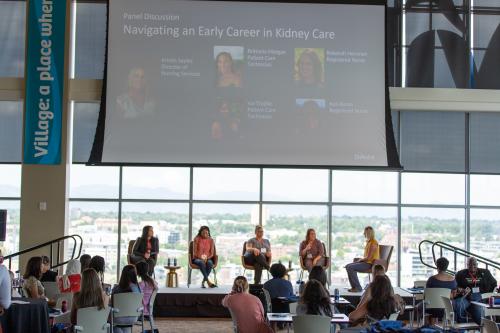DaVita Supports Patients in Hurricane-Stricken Florida
On September 28, Hurricane Ian made landfall in Southwest Florida, as a Category 4 hurricane—with subsequent landfalls in the Florida Peninsula and South Carolina. Homes and businesses along the coast were subjected to 150-mile-per-hour winds and severe rain, causing up to 13 million power outages and leaving many without running water.
This has led to many health and safety issues for people in the area, especially people who require life-sustaining dialysis treatments. DaVita operates 230 dialysis centers in Florida, with approximately 14,000 patients and 3,250 teammates (DaVita employees) working in dialysis centers.
“Planning is critical for keeping our patients and teammates safe and healthy,” says DaVita Chief Operating Officer Mike Staffieri. “In watching the forecasted path of the storm, we quickly implemented our comprehensive disaster preparedness plans to help mitigate risk for any individual requiring dialysis—whether a DaVita patient or someone who typically treats with another provider.”
DaVita deployed 15 generators to Southwest Florida and Central Florida. During this time, the kidney care company provided treatments in operating centers when patients’ typical dialysis centers needed to close. By Monday, October 3, all facilities were open except one, which reopened on Thursday, October 6. The company deployed 22 additional security officers to facilities to maintain patient and teammate safety during this time.
Teammates also thought creatively to make sure people in the communities knew DaVita was a resource for those with kidney disease. When several DaVita centers were ready to accept people who needed treatment, they wanted to get the word out—but how to do this when power, internet and phone lines were not reliable in the area? Facility administrator Amanda Stratton thought quickly and called iHeart Radio to have the message broadcast across radio stations. The message was heard, with the DaVita Ave Maria and DaVita Naples Renal Center accepting more than 165 patients, including 6 non-DaVita patients at Ave Maria and 10 non-DaVita patients in Naples.
In some cases, support has extended beyond dialysis as people face temporary homelessness. In Manasota, a group facility administrator and care team learned of a dialysis patient and his wife who were living in their car after evacuating their home. The team not only ensured the patient received treatment, but also ensured the couple had a comfortable place to rest. The team set up a “nap area” in a conference room where the patient’s wife was able to get much-needed sleep on a soft couch with blankets and pillows while her husband received his treatment.
Caring for Each Other
DaVita’s culture also places an emphasis on caring for each other, which has been put on full display throughout Hurricane Ian.
Many individuals who stayed in the area lost power and water at home, and the kidney care company also wanted to help teammates access needed resources. DaVita delivered tanks of water and gasoline, along with food and household essentials, to centers to support Hurricane-impacted teammates. For many, this meant they were able to fill their vehicle’s gas tanks and power their home generators during power outages—critical during a time when many gas stations in the area were either closed or crowded due to demand. The company also helped find temporary housing in hotels and rental homes for teammates whose homes were damaged.
“Throughout this crisis, our teammates have persistently provided life-sustaining care for our patients and supported each other,” Priya Sequeira, group vice president who oversees the region, said. “Even as they cope with personal loss, we continue to see and hear stories where individuals have put the needs of their patients and teammates above their own. It has been an incredible display of strength and community.”
When specific regions face challenges that require more teammates on the ground, DaVita issues a request for volunteers across the company. More than 310 front-line teammates answered the request during this storm, offering to travel to Florida to provide relief and extra hands in centers.
“DaVita’s teammates have always been willing to show up for each other,” Sequeira, said. “But even knowing that, I was overwhelmed by the response. We received more volunteer submissions than we needed. This—along with the relentless dedication of our teams in Florida—reminds me of what we mean when we say we are a community first and a company second.”






